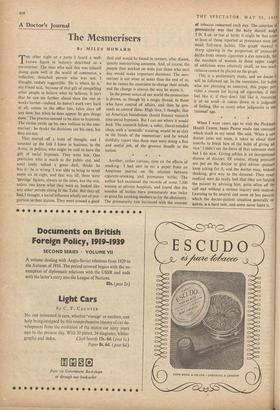A Doctor's Journal
The Mesmerisers
By .MILES HOWARD 'Tr HE other night at a party I heard a well- I known figure in industry described as a mesmeriser. The man who said this was himself doing quite well in the world of commerce, a reflective, detached person who was not, I thought, unduly suggestible. 'He is where he is,' my friend said, 'because of that gift of compelling other people to believe what he believes. It isn't that he can see farther ahead than the rest or works harder—indeed, he doesn't work very hard at all; comes to the office late, takes days off any time, but when he does appear he gets things done.' The process seemed to be akin to hypnosis. The victim yields up his own volition to the mes- meriser: he thinks the decisions are his own, but they are not.
That started off a train of thought, and I counted up the folk I knew in business, in the Army, in politics, who might be said to have the gift of social hypnosis. They were few. One politician who is much in the public eye, and until lately talked a great deal, thinks he has it : he is wrong. I was able to bring to mind some six to eight, and that was all; three were `prestige' figures, always in the news, but the rest, unless you knew what they were at, looked like any other person sitting in the Tube. But they all had, I thought, a social influence wholly out of pro- portion to their station. They went around a good deal and would be found in corners, after dinner, quietly mesmerising someone. And, of course, the people they worked on were just those who next day would make important decisions. The mes- meriser is not wiser or saner than the rest of us, but he causes his associates to change their minds, and the change is always the way he wants it.
In the power-nexus of our world the mesmeriser is drawn, as though by a magic thread, to those who have control of affairs, and then he pro- ceeds to control them. High time, I thought, that an American foundation should finance research into social hypnosis. But I can see where it would lead. The research fellow, a sober, literal-minded chap, with a 'scientific' training, would be as clay in the hands of the mesmeriser; and he would dutifully report that these men were doing a fine and useful job, of the greatest benefit to the nation.
Another, rather curious, note on the effects of smoking : I had, sent to me a paper from an American journal on the relation between cigarette-smoking and premature births. The author had examined the records of some 7,500 women at private hospitals, and found that the number of babies born prematurely was twice as great for smoking mothers as for the abstainers. The prematurity rate increased with the amount of tobacco consumed each day. The criterion of prematurity was that the baby should weigh 5 lb. 8 oz. or less at birth; it might be that some at least of those reported as premature were just small full-term babies. The graph showed sharp upswing in the proportion of premature Oirths from twenty cigarettes a day onwards, but the numbers of women in these upper ranges of addiction were relatively small, so too much reliance cannot be placed on the graph.
This is a preliminary study, and no doubt it will be followed up. In the meantime, for ladies who are planning to conceive, this paper pro' vides a reason for laying off cigarettes, if they feel like it; if they don't feel like it, reasoning is of no avail—it comes down to a judgment of feeling, like so many other judgments in this 'rational' age.
When I went years ago to visit the Peckham Health Centre, lanes Pearse made one comment which stuck in my mind. She said, 'When a neW doctor joins our team, it takes us about three months to break him of the habit of giving ad- vice.' I didn't see the force of that comment then, but I do now. Giving advice is an occupational disease of doctors. Of course, strong pressures are put on the doctor to give advice—patients keep asking for it, and the doctor may, without thinking, give way to the demand. Then manY medical men do really feel that they are helping the patient by advising him, quite often off the cuff and without a serious inquiry into motives. Learning to be neutral and more or less passives which the doctor-patient situation generally re- quires, is a hard task, and some never learn it.


































 Previous page
Previous page